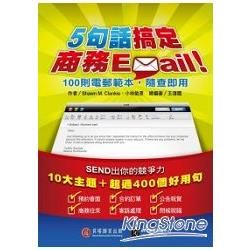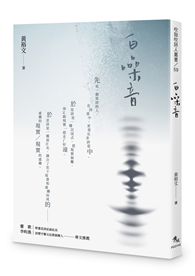.100種商務高頻主題
.100篇擬真Email範文
.100個疑難雜症 Tips
.400個溝通必備句
.546個寫作加分句
1前言
針對每封郵件主旨提供建議與提醒,在進入實際寫作前,先搞懂 Dos & Don’ts !
2實例範文
確認主旨相符後,緊急時即可直接參考運用!
3重要單字 & 句型
抓出關鍵單字與基本句型,根據自己的需要加以改寫文章,同時幫助培養寫作力。
4佳句便利貼
更多相關好用例句一網打盡!各種情境皆能應用!
5Q & A──敲定生意的關鍵
和外國人做生意,不僅是不同語言的溝通,對方的文化、習慣也該一併了解,簡潔扼要又不失禮的文字才是商場上勝出的關鍵!
6附錄
末尾特別依「開頭敬稱」、「信尾敬詞」、「起頭句」、「附件」等不同用途,擷選出400個必備好用句,隨查即用!
「時間就是金錢!」商務人士首重效率!
與客戶往來的電子郵件必須講究迅速、簡潔,
廢話不用多說,5句話就得搞定!
「商務電子郵件一定要以 Dear 開頭嗎?」
「如果不知 email 的收件者是誰的話,郵件開頭該怎麼寫?」
「ASAP、BYOB、FYI、XOXO、RSVP……這些縮寫是什麼意思?」
本書依照不同主旨,強力收錄100則範文,
清楚列出關鍵片語、句型和實用例句讓你舉一反三,
並歸納出100個職場工作者在撰寫商務英文Email時,
經常感到疑惑或根本沒注意到過的重要細節,
以Q & A的方式詳加解說。
另外,附錄更精選出400個好用例句,
方便依用途迅速找出你需要的句子。
想在職場上無往不利,你不能沒有這本書!
作者簡介
Shawn M. Clankie
美國南伊利諾大學法語系畢業(B.A.),修畢南伊利諾大學研究所 TEFL 碩士課程(M.A.)、劍橋大學研究所語言學碩士課程(M.Phil.),以及夏威夷大學研究所語言學博士課程(取得 Ph.D. 學位)。曾任夏威夷語言學學會(LSH)會長、北海道國際商務協會(HIBA)會長。現為國立大學法人小樽商科大學語言中心副教授。
著作包括《商務人士的英語會話 525 句》、《英語母語人士的常用英語會話句型排行榜》、《會話用英文文法Q&A》、《英語會話句型 600》、《英語說說看 My Life》、《靠單字精通道地英語會話》(以上為語研出版)、《語言與我們的世界》、《英語會話句型 2220》、《日本人眼中不可思議的美國人行為模式》(以上為三修社出版)、《我們的地球與健康》、《無可替代的健康與環境》(以上為成美堂出版)、《A Theory of Genericization on Brand Name Change》(Edwin Mellen Press 出版)。其文章也常見於時代雜誌、The Japan Times、Honolulu Advertiser、Verve 等刊物。URL:www.otaru-uc.ac.jp/~shawn
小林敏彥(Kobayashi Toshihiko)
小樽商科大學商學院經營法學課程畢業(大谷良雄研討會:主修國際法)、修畢夏威夷大學 Manoa 分校研究所英語教育研究系課程(MA in ESL)、(同時、依序)取得夏威夷州議會口譯員執照。曾任夏威夷大學日本語講師,現為國立大學法人小樽商科大學商學院研究所教授。
為 TESOL 學會、大學英語教育學會(JACET)、電影英語教育學會(ATEM)、時事英語學會(JACES)會員。柔道 2 段、KEG:KOBA English Gym 主辦人。愛好西洋電影與健身。
著作包括《新聞英語終極 10,000 字》、《商務人士的英語會話 525 句》、《英語母語人士的常用英語會話句型排行榜》、《會話用英文文法Q&A》、《英語會話句型 600》、《英語說說看 My Life》、《靠單字精通道地英語會話》、《日常生活英語會話的道地說法》(以上為語研出版)、《和洋人老師對話》(大修館書店)、《電影英語教育論》(SCREENPLAY 社)、《無可替代的健康與環境》(成美堂)、《英語會話句型 2220》(三修社)、《英語聽力教材開發的理論與實踐》(小樽商科大學出版會)等。主要論文有《Native and Nonnative Reactions to ESL Compositions》(TESOL Quarterly, vol.26, No.1, Spring 1992)。












